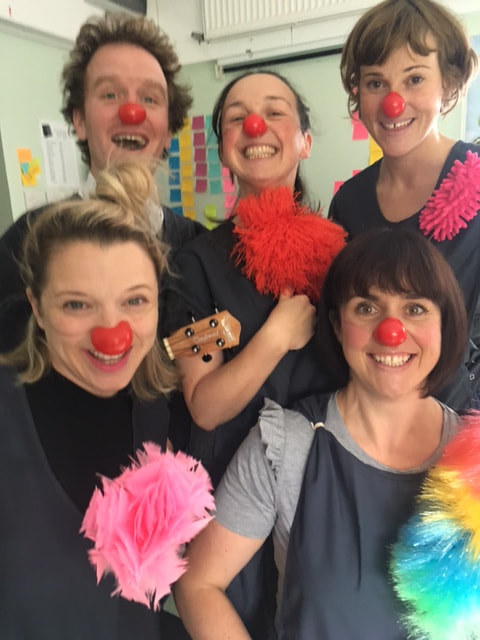|
During our 2 week residency at Mavisbank School, a young theatre company came in to perform their panto. I was intrigued. They seemed like a company that go around all schools, so I wondered how they might have adapted their performance to suit this audience...
All of the children were wheeled into the school hall - some in chairs, some in bed. They all have profound and multiple learning disabilities, none have verbal communication and they are dependent on others for all of their primary care needs. The show began. 'Hello boys and girls!' 'You can do better than that, boys and girls! Say it louder, boys and girls!' and then, 'Clap your hands, boys and girls! Come on! That's it! Clap your hands!' My. Heart. Sank. I saw nothing but terror in the eyes of the performers. Most of the children were taken out of the hall before the end of the performance. The directors were sitting at the back of the hall checking e-bay for Christmas Elf costumes. !!%$&*&^%^&**!!! I don't blame the theatre company - these were talented young performers, with no training or expertese in working with this audience, and they'd been booked for a gig and they need to pay their rent. As far as the school is concerned, they are keen for their young people to have access to The Arts but what is available at the moment for schools for children with complex needs in Scotland is seriously lacking, and in my mind, most of it is a total waste of time and money for children, schools, and theatre companies alike. Our aim with the Empty Pockets project was to do something about this, and use our combined knowledge to make something completely different, genuinely enjoyable and worthwhile for the young people it was made for. Our 2 week residency enabled us to consider every detail and possibility of the theatre piece in collaboration with the children, who taught us everything, and staff who gave us amazing and insightful feedback. Textures of props, colours, sound and volume, recorded voice or live voice, proximity and distance, interactive and passive experience, language, characterisation, level of conflict, vocalisation, silence, breath and space. All of these things were directly informed by testing and workshopping with children in their classrooms. Where one theatre company might need the audience to be brought into a school hall, we wanted to develop a piece of quality theatre for the classroom to give the children a better chance of being relaxed and able to enjoy and participate in the experience. We wanted to make the ordinary extraordinary, and leave their everyday space bristling with a sense of magic and play. Equally central to the project was to respect children's abilities (no 'clap your hands' to a room full of children who can't voluntarily move their hands) and empower them by making a performance that was truly affected by, and gave ample space for each individual’s reactions. We wanted to take risks and place our audience at the centre of the performance. Most of all, we wanted to engage with every child’s right to have an effect on the world, including on the world of play and make-believe. I am so proud of the outcome, and feel passionately that this piece of theatre should have a long life touring schools in Scotland. Hopefully there will be some photos and maybe even a little film soon. It isn't something that can really be effectively described here. After our first sharing, we overheard one class teacher explaining the project to somebody in the corridor, 'This company has come in and shown us that our children can enjoy theatre' Well. you can't ask for much more than that.
1 Comment
|
AuthorI am a therapeutic clown and performer. Writing here is part of my wider practice and maybe some of my thoughts will trigger some thoughts of your own and I hope that helps. Archives
May 2024
Categories |

 RSS Feed
RSS Feed